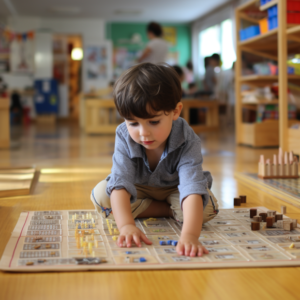Montessori education is renowned for its inclusive and individualized approach, making it well-suited for children with diverse learning needs, including those with special needs. Maria Montessori’s philosophy revolves around respecting the unique abilities and pace of each child, making it an ideal framework for fostering the growth and development of children with varying challenges. Let’s explore how Montessori education embraces and supports children with special needs.
The Role of the Montessori Educator
In a Montessori classroom, educators play a crucial role in creating an environment that caters to the diverse needs of all children. They are trained to observe and understand each child’s strengths, weaknesses, and interests. By doing so, they can tailor the learning experience to match the child’s individual learning style.
Adapting the Environment
The Montessori environment is thoughtfully designed to be accessible and supportive for all children. For children with physical challenges, the classroom layout is adjusted to accommodate mobility and independence. Materials and activities are arranged in a way that enables children to engage with them comfortably.
Individualized Learning
In Montessori education, children have the freedom to choose activities that resonate with their interests and abilities. For children with special needs, this individualized approach is particularly beneficial. Educators can modify materials and activities to suit a child’s unique requirements, allowing them to progress at their own pace.
Hands-On Learning and Sensory Exploration
Montessori education emphasizes hands-on learning and sensory exploration, which can be highly beneficial for children with special needs. Manipulating materials and engaging in tactile experiences promote cognitive and motor skill development.
Promoting Independence and Confidence
Montessori education places a strong emphasis on fostering independence and self-confidence in children. For children with special needs, gaining a sense of autonomy can be empowering and transformative. Montessori educators gently guide children to master tasks and skills, which boosts their self-esteem and motivation to learn.
Social Interaction and Inclusion
In a Montessori classroom, socialization is a natural part of the learning process. Children with special needs are encouraged to interact with their peers, fostering a sense of belonging and inclusion. Montessori educators create a supportive environment where children learn to understand and respect each other’s differences.
Collaboration with Parents and Therapists
Montessori educators work closely with parents and therapists to create an effective support system for children with special needs. Open communication and collaboration ensure that the child’s needs are met comprehensively, both at school and home.
Conclusion
Montessori education offers a compassionate and inclusive approach that celebrates the uniqueness of each child, including those with special needs. By creating an environment that fosters independence, individualized learning, and social interaction, Montessori educators empower children to reach their full potential. Embracing diversity and promoting a love of learning, Montessori education continues to be a beacon of inclusivity and growth for all children.

